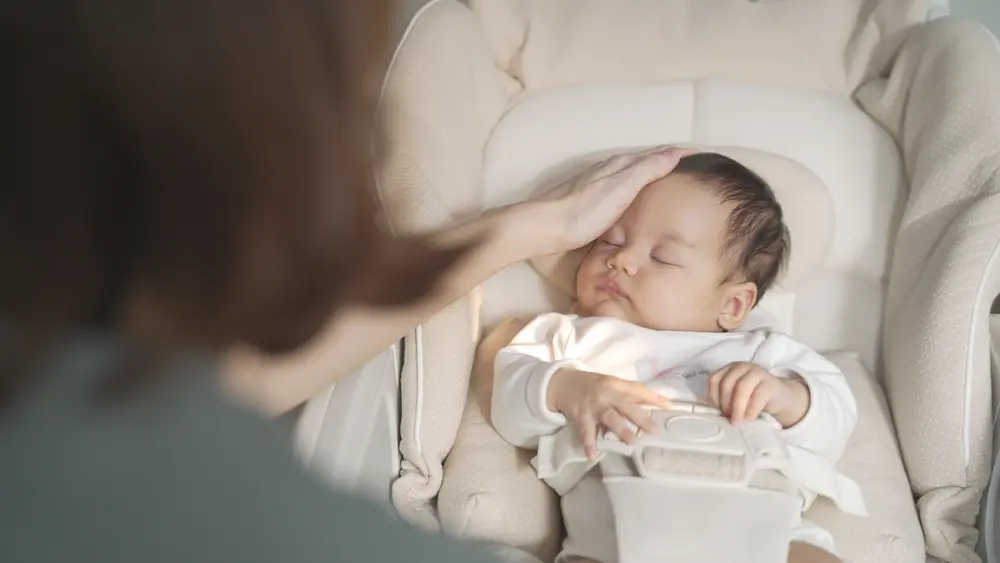If there’s one thing we all want, it’s more sleep, right? But getting a baby to sleep through the night feels like unlocking some kind of secret code. After countless nights of pacing the nursery, endless Google searches, and a few panicked calls to my mom friends, I’ve gathered some of the best tips that actually worked for me—and yes, they’re backed by experts too!
If you’re tired of hearing the same old advice (swaddling, white noise, and sleep training, anyone?), you’re in the right place. I’ve got a few fresh, real-life mom-tested tricks that just might save your sanity and get you and your little one the sleep you deserve.
So, grab a cup of coffee—or let’s be honest, that third cup of coffee—and let’s dive into some unexpected, but effective, baby sleep solutions. Because if there’s one thing moms need, it’s more Zzz’s!
Understanding Baby Sleep (and Why It’s So Tricky!)
First, let’s take a moment to understand why baby sleep can feel so elusive. Unlike adults, babies don’t have fully developed circadian rhythms—their natural sleep-wake cycles. For the first few months, babies are learning to differentiate between day and night, which is why those middle-of-the-night wake-ups are so frequent. And let’s not even get started on sleep regressions, growth spurts, or teething, which can throw any routine right out the window.
The challenge of baby sleep is something all moms face, and as we all know, one method doesn’t work for every baby. What worked like magic for your best friend’s little one might feel like an impossible task for your own. That’s where it helps to have a variety of tips in your toolkit—and to lean on expert insights to understand what’s happening behind the scenes.

Dr. Amanda Hill, a pediatric sleep specialist, emphasizes that sleep is developmental and there’s no one-size-fits-all solution. “Every baby is unique, and what parents should focus on is creating a consistent sleep environment. Babies thrive on routine, but it’s also essential to stay flexible because their needs can change from week to week,” she explains.
Dr. Hill also highlights the importance of understanding sleep cues. “Many parents wait too long to put their babies down for a nap, not realizing that overtiredness actually makes it harder for babies to fall asleep. Watch for those subtle cues—rubbing eyes, yawning, or turning away from stimulation. That’s your signal to act.”
Tips That Hopefully Work For You!
Now that we’ve covered some basics, let’s dive into the real reason you’re here—the sleep tips you haven’t tried yet! These are the unconventional, mom-tested, and expert-approved tricks that worked for me and my mom friends when nothing else seemed to do the trick. Trust me, I’ve been there, scrolling through social media at 3 a.m., desperate for something new. And here’s what I found!

1. The “T-shirt Trick” – A Familiar Scent Can Work Wonders
One of the most genius hacks I came across on Instagram (thanks @mommaminds!) is the T-shirt trick. This one’s so simple, but it was a game-changer for us. After wearing a soft cotton T-shirt all day, I would lay it down in my baby’s crib under the fitted sheet, or just near their head, so they could smell me even when I wasn’t holding them. Babies have a strong sense of smell, and having something familiar nearby can help soothe them to sleep
Dr. Amanda Hill, our sleep expert, says, “Babies are comforted by their mother’s scent because it’s something they’ve associated with safety since birth. Using this method can ease separation anxiety, especially during nighttime.” Just be sure to always follow safe sleep guidelines—no loose blankets or objects in the crib!
2. The Magic of “Gentle Touch” During Sleep Transitions
Here’s a tip from my friend Jessica, a fellow mom of two. Jessica swears by a technique she calls “gentle touch.” During those delicate moments when your baby starts to stir but hasn’t fully woken up, she suggests placing a firm but gentle hand on their chest or back. “I found that just the pressure of my hand helped calm them down before they fully woke up. It kept them from getting startled and helped them transition between sleep cycles,” Jessica shared.
It turns out there’s science behind this. Experts like Dr. Hill explain that this kind of calming pressure can mimic the feeling of being held, which naturally soothes babies and reassures them that they’re safe.
3. White Noise… But Make It Personalized
We’ve all heard about using white noise to help babies sleep, but here’s a fun twist I found in a mom group on Facebook. Instead of the standard rain or fan sounds, try recording your own voice singing softly or talking to your baby. One mom, @sleepyheadsonya, shared that her little one loved hearing her soft humming in the background. “It’s not the quality of the singing—it’s just hearing mom’s voice that calms them down,” she wrote.
This works because your baby is used to hearing your voice, even from the womb, so it creates a sense of security. If you’re not up for recording your own voice, try something like a shushing app that lets you customize the sound and rhythm.
4. The 3-Step Routine—But With a Twist
Okay, we all know routines are important, but my friend Emily swears by her 3-step routine with a twist. “I tried bath, book, bed, but it never worked for us,” she told me. Instead, she found that starting with a calming activity, like baby massage, followed by a short feeding, then dimming the lights and playing quiet lullabies created the perfect environment for sleep. “The twist is all about the lighting and music—setting a mood just as much as following a routine.”
Dr. Hill confirms that consistency in routines is key, but adds, “The environment plays a huge role in signaling to babies that it’s time for sleep. Keeping lights dim and sounds soft helps calm their overstimulated senses.”
5. Daytime Naps = Better Night Sleep (Yes, Really!)
One of the most counterintuitive pieces of advice I received came from a mom on Twitter, @mommyinsights, who said: “Don’t skip the naps!” At first, I thought, how can letting my baby nap more during the day help with nighttime sleep? But the truth is, overtired babies sleep worse.
Dr. Hill supports this by explaining that babies who get enough daytime sleep are more rested and less likely to wake up from being overtired at night. “Sleep begets sleep,” she says. “Ensuring your baby has enough restorative naps during the day leads to more consolidated nighttime sleep.”

At the end of the day, finding the right baby sleep solution can feel like solving a puzzle. Every baby is unique, so what works for one might not work for another. The key is to stay patient, flexible, and open to trying new things. Whether it’s the familiar scent of your T-shirt, a gentle touch, or a new twist on bedtime routines, one of these tips might just be the thing that helps you (and your little one) finally get some much-needed rest.
Sleep tight, mama—you’ve got this!

